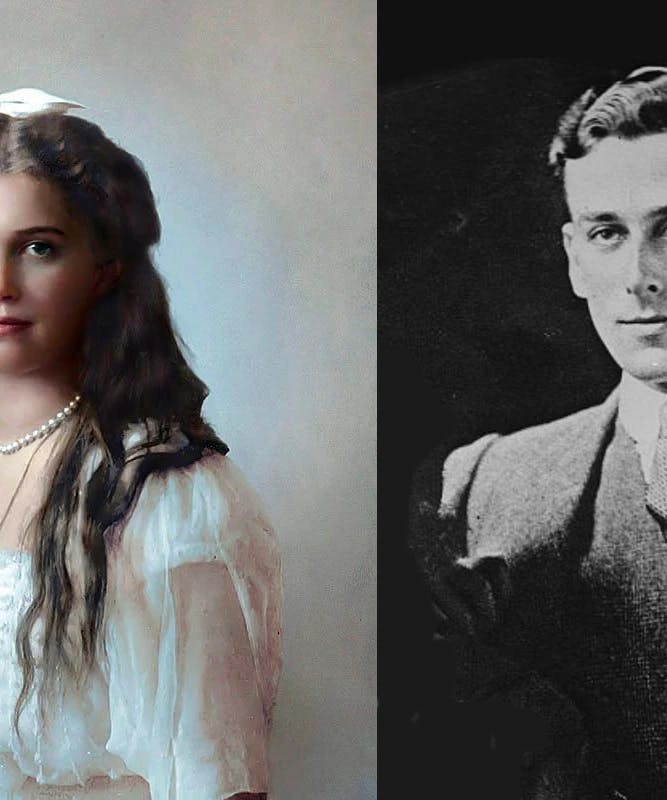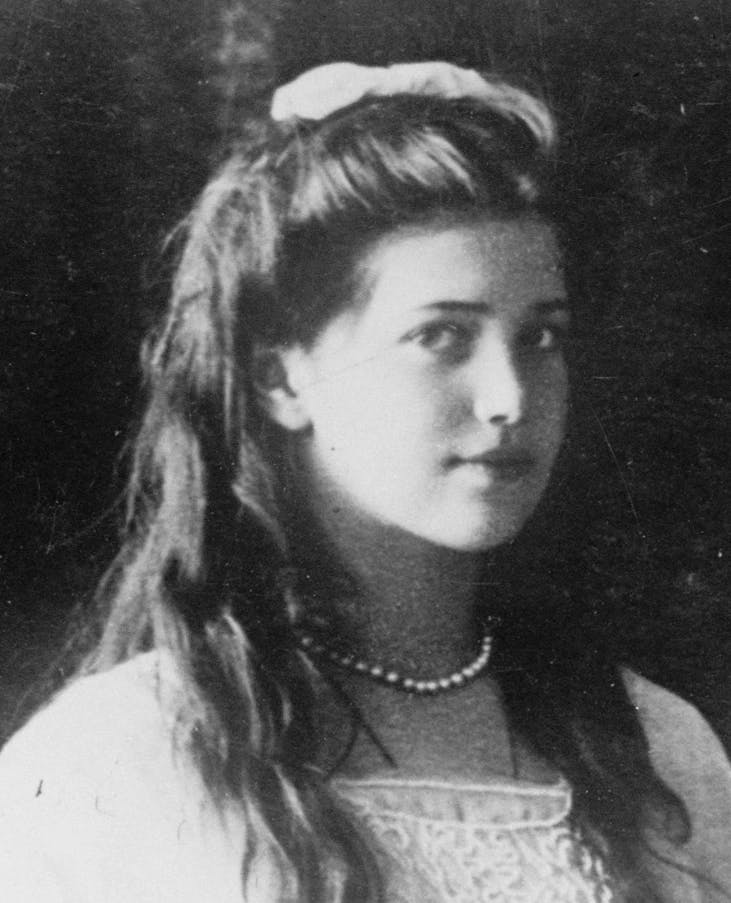Lord Louis Mountbatten And Grand Duchess Maria Romanov: The Royal Love Story That Never Was
Though Lord Louis “Dickie” Mountbatten only appeared in the first episode of the new season of “The Crown,” his influence over Prince Charles is present throughout the entire season.

Known as “Uncle Dickie,” Lord Mountbatten was uncle to Prince Philip (the husband of Queen Elizabeth II) and "Honorary Grandfather" and mentor to Prince Charles. He has appeared in previous seasons of the show, but this season is the most significant. Beloved by his family and the British people, many know Lord Mountbatten for his "open marriage" and his influence over Prince Charles' love life by teaching him his playboy ways. What many don’t know is that he was once in love with one of the daughters of Nicholas II, the last Tsar of Russia.
You’re likely familiar with the youngest daughter of Nicholas II, Grand Duchess Anastasia, who was the subject of a 1997 animated musical, Anastasia, and the 2016 Broadway musical of the same name. You’re probably also familiar with his son Alexei, whose hemophilia led to the rise of the infamous “mad monk” Grigori Rasputin.
The lesser-known children of Nicholas II were his three eldest daughters; Olga, Tatiana, and Maria. Mountbatten fell in love with Grand Duchess Maria Romanov of Russia as a child but never got to pursue her because she was murdered alongside her family and close servants in 1918 as a part of the Russian Revolution. She was 19 years old.
The Story of Maria and Dickie
Mountbatten was fascinated by the Russian royals before he ever met Maria, and the proof is in his name. “Dickie” is a common nickname for Richard, and Richard isn’t one of Lord Mountbatten’s given names, but Nicholas was.
Mountbatten told his biographer, “My brothers and sisters always wanted to call me Nicky, but my parents pointed out that it would lead to confusion with the Tsar. They then for some curious reason suggested Dickie, and my mother was most amused because they obviously didn’t know that her private pet name for my father was ‘Dickie Bird’.”
The royal cousins (it was very common for royals to fall in love with and marry first and second cousins to retain the family lineage) met in 1910 when Maria was 11 and Mountbatten was 10. He was immediately smitten by the beautiful Romanov sisters.
Mountbatten wrote, "Oh, they were lovely, and terribly sweet, far more beautiful than their photographs show. I was crackers about Marie, and was determined to marry her. She was absolutely lovely. I keep her photograph in my bedroom — always have."
It makes sense that he immediately took a liking to Maria for she seemed to have a positive effect on every person she met. A family friend described her as “admittedly the prettiest of the four — a typical Russian beauty, rather plump, with cheeks red as apples.” Her inner beauty also reflected her outer beauty, for she was also described as “unpretentious and kind, often caring for her frequently ailing mother and haemophiliac brother.”
Though Maria’s feelings for Mountbatten are not known with certainty (her 1910 diaries were destroyed during the Russian Revolution), a 1910 letter to her from her mother proves that it’s a possibility. Her mother wrote, “Now that you are a big girl, you must be more careful and not show those feelings […] One must not let others see what one feels inside.” Although there’s no definitive proof that she’s talking about Mountbatten, it’s a strong possibility since the Romanov sisters were rarely exposed to boys their age before World War I began in 1914.
Though they never saw each other again, Mountbatten and Maria exchanged postcards for the remainder of her life before the Russian Revolution in 1917. The start of the revolution caused Mountbatten great anxiety. In a letter to his mother, he wrote, “How awful about what has happened in Russia. I suppose Uncle Nicky is quite safe, though I can’t understand why he has abdicated.”
How Maria’s Death Affected Dickie
Believe it or not, the effects of the murder of Maria and her family are still seen around the world today. The murder helped the Bolsheviks rise to power and helped their Marxist ideas spread across the world.
It also hit a personal nerve with the British royals, especially King George V (cousin of Tsar Nicholas II and grandfather of Queen Elizabeth II), who allegedly felt guilty for not saving the family when he could. Mountbatten’s sister (and mother to Prince Philip), Princess Alice of Battenberg, also tried to save the Romanov sisters from their horrific fate and failed. The British royals ultimately helped solve the mystery of the Romanov murders, for a DNA sample from Prince Philip helped confirm that bodies found near the murder site were the Romanovs.
Though it’s nice to think that Mountbatten loved Maria for the rest of his life, he didn’t have the best romantic track record.
After Maria’s murder, Mountbatten was forced to find someone else to marry. In 1922, he married British heiress Edwina Ashley. The marriage was infamous for infidelity on both sides, as Mountbatten said, “Edwina and I spent all our married lives getting into other people’s beds.”
Mountbatten publicly discussed how the murder affected him and his family for the first time in 1969. He said, “We had very little news of the family after the Bolsheviks took over. We all hoped that they would ultimately be sent into exile, but we feared the worst. Even when it happened, it was a long time before we heard the details, which were quite horrible […] these horrible deeds cast a shadow over the whole of my family for a very long time.”
Mountbatten visited Russia (then the Soviet Union) for the first and only time in 1975. He toured the old Romanov palaces where Maria once lived, and it’s rumored that he "spoke endlessly of Maria" on the trip.
As seen on The Crown, Mountbatten was murdered in 1979 by an IRA bomb. The murder devastated the British people, as Prime Minister Margaret Thatcher said, “His death leaves a gap that can never be filled. The British people give thanks for his life and grieve at his passing.”
Though we’ll never know what would have happened between Mountbatten and Maria if she hadn’t suffered such a tragic fate, it’s interesting to note that a man known for adulterous affairs was once such a hopeless romantic. It may be romanticizing the story to say that he never truly got over her death or truly stopped loving her, leading to him refusing to commit to another woman for the rest of his life. However, even the strongest of skeptics can’t deny that the similarities of their deaths echo something out of a poetic and romantic tragedy.
What Modern Women Can Learn from Maria
What strikes me as the most interesting thing about the story is the kind of young woman Maria was. Though she only lived to be 19, she managed to leave a mark on everyone she met.

Maria Romanov, 1914. Public domain via Wikimedia Commons.
Known to be beautiful inside and out, a family friend described her as “tall, healthy, with sable eyebrows and a bright blush on her open Russian face; she was especially lovely to a Russian heart…her eyes illuminate her entire face with a unique, radiant luster; they sometimes seem black, as long eyelashes throw shadows over the bright blush of her soft cheeks. She is merry and alive, but she has not yet awakened completely to life; probably concealed in her are the immense forces of a real Russian woman.”
She was also known for her kind and maternal nature. One of her contemporaries wrote, “Had she not been the daughter of the Tsar, this strong, warmhearted girl would have made some man an excellent wife.” When she was held in captivity with her family during the Russian Revolution, even some of the guards took a liking to her. One described her as “kind-hearted, cheerful, with an even temper, and friendly.”
She was the perfect example of femininity in her time as well as now. Though some think of femininity as weak or frivolous, Grand Duchess Maria’s kindness is something to admire and aspire to. Outer beauty fades with time, but Maria’s inner beauty has lasted for over a century after her tragic death.
Closing Thoughts
The fourth season of The Crown tells the story of Prince Charles and Princess Diana, and their marriage likely would have never occurred without the influence of Lord Louis Mountbatten. Though he’s famous for his extramarital affairs, nothing is as beautiful or romantic as his childhood love for Grand Duchess Maria Romanov of Russia.